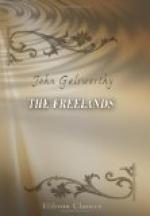And the grass went on ripening. Many and various as the breeds of men, or the trees of a forest, were the stalks that made up that greenish jungle with the waving, fawn-colored surface; of rye-grass and brome-grass, of timothy, plantain, and yarrow; of bent-grass and quake-grass, foxtail, and the green-hearted trefoil; of dandelion, dock, musk-thistle, and sweet-scented vernal.
On the 10th of June Tod began cutting his three fields; the whole family, with Nedda and the three Tryst children, working like slaves. Old Gaunt, who looked to the harvests to clothe him for the year, came to do his share of raking, and any other who could find some evening hours to spare. The whole was cut and carried in three days of glorious weather.
The lovers were too tired the last evening of hay harvest to go rambling, and sat in the orchard watching the moon slide up through the coppice behind the church. They sat on Tod’s log, deliciously weary, in the scent of the new-mown hay, while moths flitted gray among the blue darkness of the leaves, and the whitened trunks of the apple-trees gleamed ghostly. It was very warm; a night of whispering air, opening all hearts. And Derek said:
“You’ll know to-morrow, Nedda.”
A flutter of fear overtook her. What would she know?
CHAPTER XXVII
On the 13th of June Sir Gerald Malloring, returning home to dinner from the House of Commons, found on his hall table, enclosed in a letter from his agent, the following paper:
“We, the undersigned laborers on Sir Gerald Malloring’s estate, beg respectfully to inform him that we consider it unjust that any laborer should be evicted from his cottage for any reason connected with private life, or social or political convictions. And we respectfully demand that, before a laborer receives notice to quit for any such reason, the case shall be submitted to all his fellow laborers on the estate; and that in the future he shall only receive such notice if a majority of his fellow laborers record their votes in favor of the notice being given. In the event of this demand being refused, we regretfully decline to take any hand in getting in the hay on Sir Gerald Malloring’s estate.”
Then followed ninety-three signatures, or signs of the cross with names printed after them.
The agent’s letter which enclosed this document mentioned that the hay was already ripe for cutting; that everything had been done to induce the men to withdraw the demand, without success, and that the farmers were very much upset. The thing had been sprung on them, the agent having no notion that anything of the sort was on foot. It had been very secretly, very cleverly, managed; and, in the agent’s opinion, was due to Mr. Freeland’s family. He awaited Sir Gerald’s instructions. Working double tides, with luck and good weather, the farmers and their families might perhaps save half of the hay.




